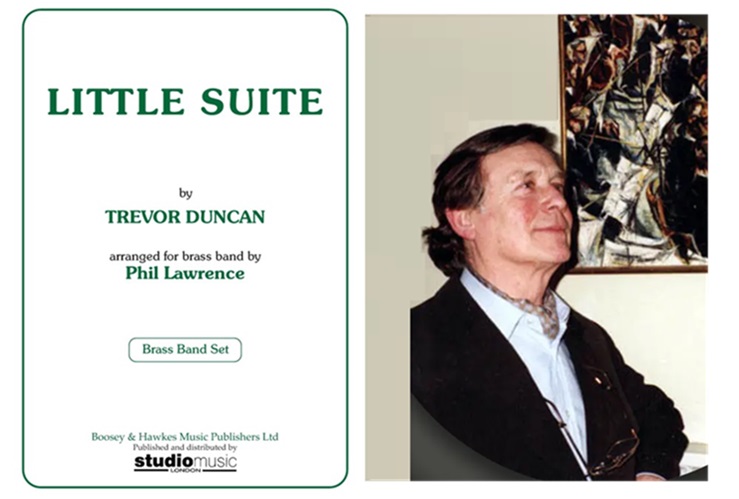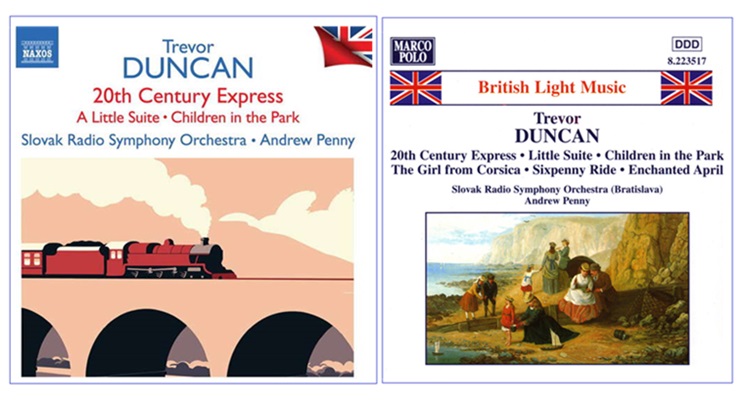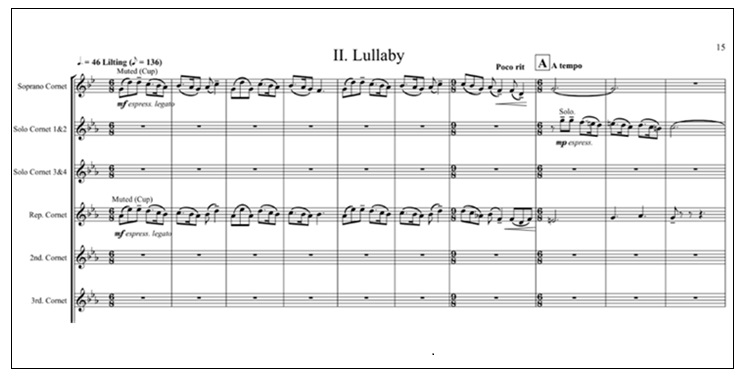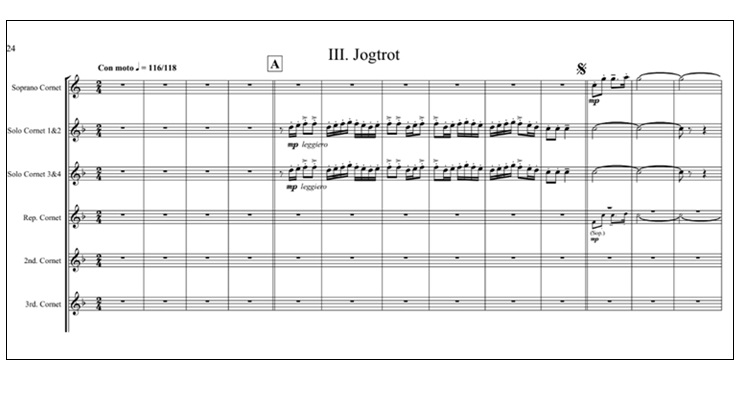
Trevor Duncan was one of group of gifted composers whose work provided the musical backdrop to the emerging radio and television era of post-War Britain.
Although sometimes dismissed as ‘Light Music’ (due in part to it being heard on the BBC Light Programme station from 1945 to 1967), it is anything but – the style built on substantive academic rigour.
For over two decades the output of the likes of Ronald Binge, Eric Coates, Frederick Curzon, Madeleine Dring, Robert Farnon, Edward German, Albert Ketelby, Gordon Langford, Ernest Tomlinson, Gilbert Vinter, Haydn Wood and Peter Yorke was heard daily - from dawn until dusk, at home and more significantly, in workplaces.
Collective memory
Today, their names remain only fleetingly known to the general public, although from Coates’ ‘By the Sleepy Lagoon’ (used for Radio 4’s ‘Desert Island Discs’) to Binge’s ‘Sailing By’ (the 'Shipping Forecast') and even the ubiquitous series of BBC television ‘test cards’ (by Ernest Tomlinson amongst others) the music remains embedded in collective memory banks.
Trevor Duncan (Leonard Charles Trebilcock) was born in London in 1924. Although he studied for a year at Trinity College of Music, he was largely self-taught, and joined the BBC aged 18 to work as a musical assistant on radio plays. He returned there from war time service and was given his ‘break’ by producer Ray Martin who used a short work of his entitled ‘Vision in Velvet’.
Today his name is largely forgotten, yet he provided music to the seminal BBC television series ‘Quatermass II’ (1955) and ‘Quatermass and the Pit’ (1958) as well as for the opening titles to the iconic 1957 film, ‘Plan 9 from Outer Space’.
‘High Heels’ soon followed but due to the BBC’s policy restricting employees having their music performed on air (he had to write under the compositional pseudonym of Trevor Duncan) his growing profile meant that he left the BBC in 1956 to become a full-time composer.
Impressive library
Today his name is largely forgotten to the current generation of viewers and listeners, yet he provided music to the seminal BBC television series ‘Quatermass II’ (1955) and ‘Quatermass and the Pit’ (1958) as well as for the opening titles to the iconic 1957 film, ‘Plan 9 from Outer Space’.
He died in 2005, but also left an impressive library of orchestral works, including ‘Sinfonia Tellurica’, ‘The Navigators’, ‘St Boniface Dawn' and ‘The Challenge of Space’.

Character and style
The style of his work is marked by melodic character and surefooted style – from the almost ‘Carry On’ feel of ‘Making Tracks’ to the hint of Peter Yorke’s ‘The Shipbuilders’ in ‘The Navigators’ – Passage to Windward’, the new Elizabethan age of optimism of ‘Aim and Endeavour’ to the dramatic spaceage sci-fi of ‘Escape Velocity’.
‘Little Suite’ was written in 1959 and was to later find fame with the public with its opening ‘March’ used as the theme tune to the popular BBC television series ‘Dr Finlay’s Casebook’ which ran from 1962 to 1971 and was later revived as a radio series (1970 – 1978 and again in 2001).
‘Little Suite’ was written in 1959 and was to later find fame with the public with its opening ‘March’ used as the theme tune to the popular BBC television series ‘Dr Finlay’s Casebook’
Background mood
Although the series is set in the fictitious Scottish town of Tannochbrae, it was actually based on a 1935 novella by author A J Cronin, who worked and wrote about his experiences of being a GP in the Welsh mining town of Tredegar.
Sent by Duncan’s publishers Boosey & Hawkes to the BBC alongside ‘The Girl from Corsica’ for consideration as ‘background mood’ library music, both were soon utilised (although allegedly only after a junior assistant had been sent to the archives to see what may not have been previously used before).

Landscape portraits
‘Little Suite’ is in essence a triptych of landscape portraits – and certainly more 1950s small town English urban than anything remotely approaching the Scottish Highlands in its jaunty opening ‘March’.
It’s a bit like ‘All Creatures Great and Small’ meets ‘Call the Midwife’.
it does however bring to mind the image of the good doctor winding into town on an A road in his little Austin 7, full of NHS optimism and all manner wonder drugs to fix the ailments of a waiting room full of local ‘characters’.
Winding into town
Marked ‘Allegro’ crotchet = 124, it does however bring to mind the image of the good doctor winding into town on an A road in his little Austin 7, full of NHS optimism (he certainly wouldn’t have been if he was driving a British Leyland Austin ‘Allegro’) and all manner wonder drugs to fix the ailments of a waiting room full of local ‘characters’.

Lullaby
It is followed by a lilting 6/8 ‘Lullaby’ led by the soprano and repiano, textured in expressive flow (with use of the glockenspiel, vibraphone and wind chimes in addition to timps and cymbals)
It evokes a horizon lit by a low orange yolk of an evening sun setting on a landscape yet to be spoiled by the urban concrete sprawl of the emerging ‘New Towns’, motorway bypasses and green fields covered by windfarms and solar panels.
It's busy but not frenetic, with its hints of the opening theme just peeking through as if reminding the listener that the pace of small town 1950s England had not yet quite lost its essence of its horse drawn Victorian past to the ‘White Heat of Technology’ of internal combustion that was soon to come in the early 1960’s.
Jogtrot
The finale is entitled ‘Jogtrot’ - paced ‘con moto’ at just under crotchet 120 and underpinned by a light pulse and precision.
It's busy but not frenetic, with its hints of the opening theme just peeking through as if reminding the listener that the pace of small town 1950s England had not yet quite lost its essence of its horse drawn Victorian past to the ‘White Heat of Technology’ of internal combustion that was soon to come in the early 1960’s. It ends with a whimsical abruptness.

Cleverly captured
Phil Lawrence is a composer who certainly knows his way around a television and film score. Not surprisingly then his arrangement cleverly captures the essential character style of the music with a lightness of scoring touch – the dynamics carefully calibrated, the textures helped by use of mutes and tuned percussion.
Not surprisingly then his arrangement cleverly captures the essential character style of the music with a lightness of scoring touch – the dynamics carefully calibrated, the textures helped by use of mutes and tuned percussion.
Coming in at around 12 minutes in duration, it is a piece that provides bands and MDs with the opportunity to test their stylistic appreciation of music that requires agility and deftness, as well as a concert audience with a timely reminder of a media age when not everything was driven to appeal to crass consumerism.
Iwan Fox
To purchase
Studio Music:
Cost: £42.95
https://www.studio-music.co.uk/m050096146-trevor-duncan-phil-lawrence-brass-band-little-suite
To listen:
Original orchestral suite
March: https://youtu.be/3c-u4hhqMN0?si=r4DIz1VxoCMsWuJM
Lullaby: https://youtu.be/1VhA2Rj3eTU?si=wjcrqH65naD1UkBp
Jogtrot: https://youtu.be/86l_23TXTr8?si=sh_75Y6WCoN2J0I3
Find more tracks at:
https://www.tracklib.com/music/artists/trevor-duncan
Naxos CD purchases:









